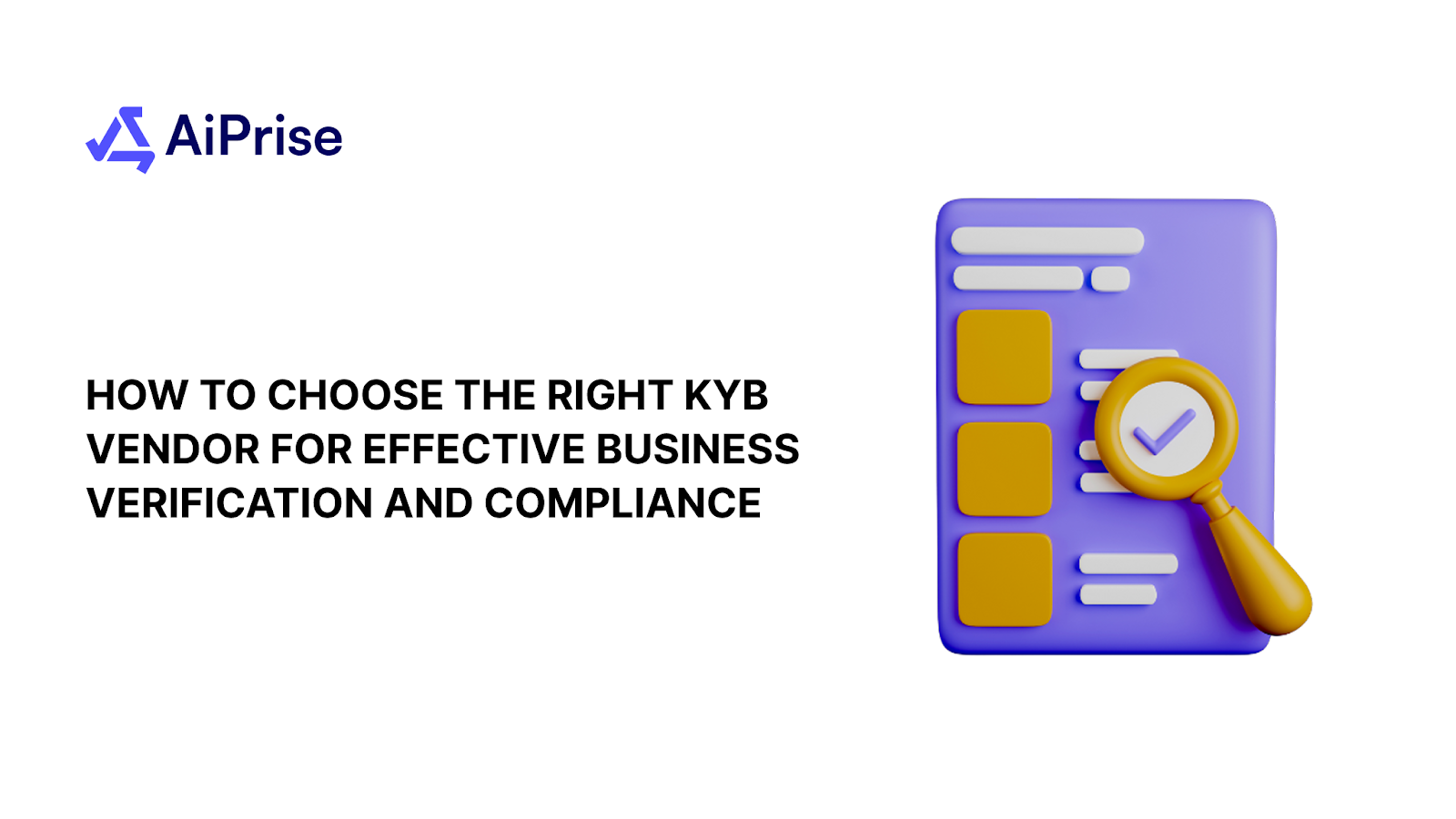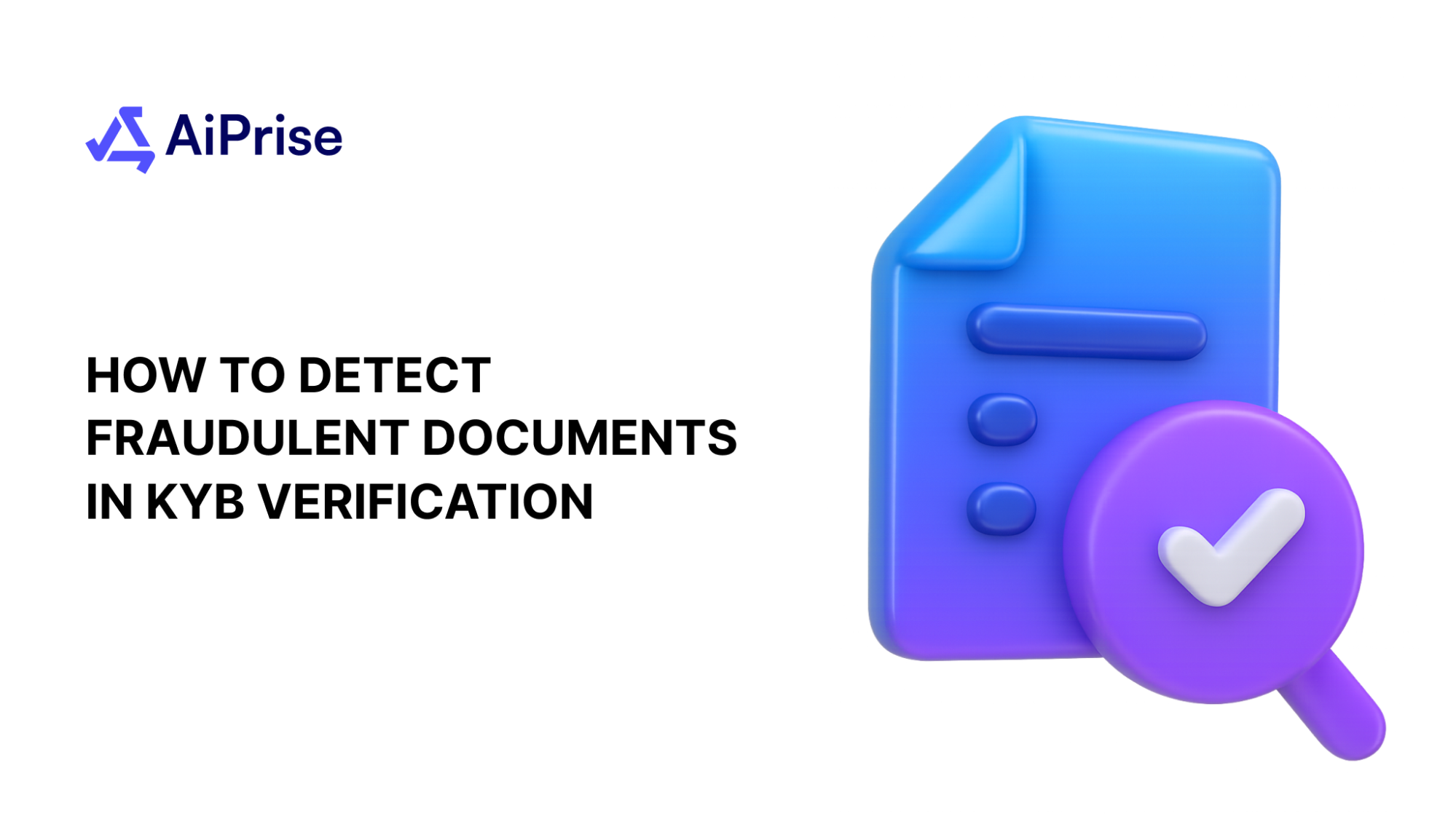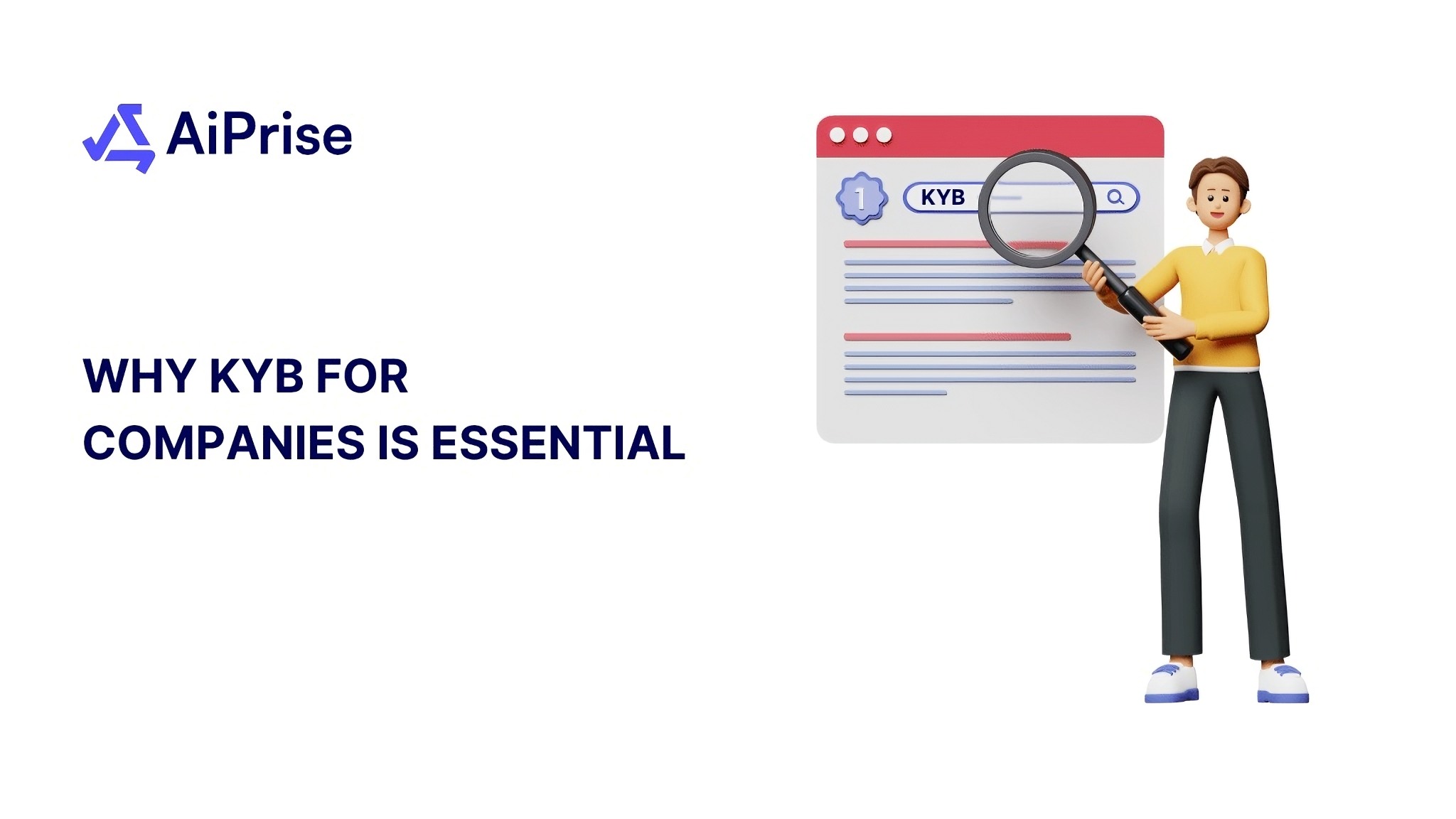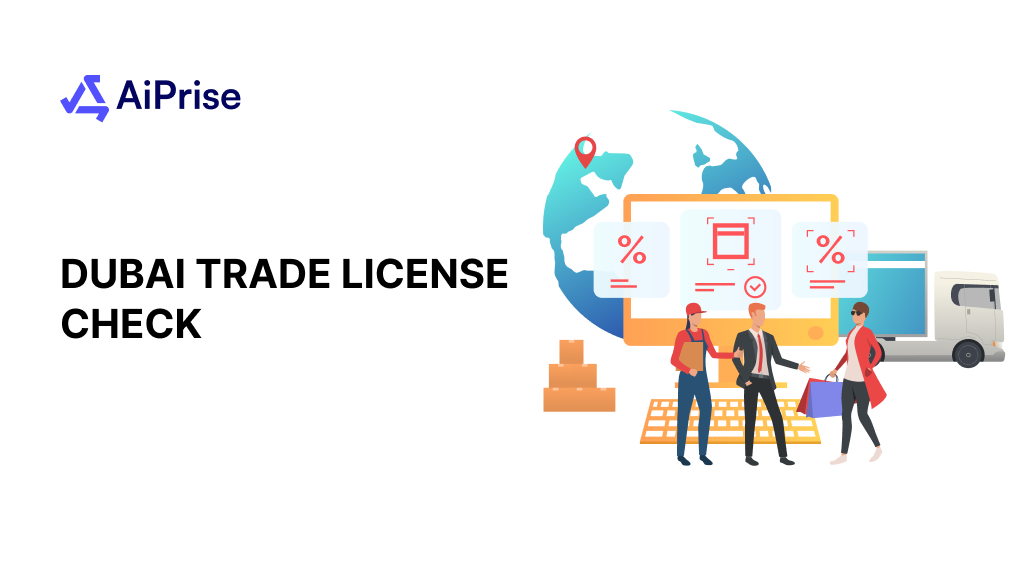AiPrise
10 min read
January 26, 2025
How To Do KYB In The UK?

Key Takeaways










Ensuring compliance and fostering trust are critical for businesses operating in the UK’s complex regulatory environment. One key element of achieving this is Know Your Business (KYB)—a process designed to verify business entities' legitimacy, ownership, and compliance.
As the UK maintains stringent Anti-Money Laundering (AML) regulations, KYB is vital in safeguarding businesses from financial crimes and enhancing their credibility.
This blog explores the essentials of conducting KYB in the UK, including its regulatory framework, required documents, steps, and how technology can simplify the process.
Understanding KYB In The UK
KYB refers to verifying a business entity's legitimacy before entering into a commercial relationship with it. This verification process is essential for maintaining trust and integrity within the financial system.
- Definition
KYB (Know Your Business) refers to verifying a business’s identity, ownership, and compliance with applicable laws. It is a critical measure for mitigating risks, ensuring transparency, and maintaining regulatory adherence.
By conducting KYB checks, businesses confirm the legitimacy of their corporate partners and safeguard themselves from fraudulent entities.
- Importance of KYB Checks for Compliance with UK AML Regulations
The UK has robust AML (Anti-Money Laundering) regulations that require businesses to perform KYB checks. These checks ensure that companies are not unwittingly facilitating money laundering, terrorism financing, or other financial crimes.
Compliance with KYB meets legal obligations and enhances the integrity and trustworthiness of your business operations.
- KYB's Role in Ensuring Business Integrity and Reducing Financial Risk
KYB goes beyond regulatory compliance—it’s a tool for minimizing financial and reputational risks. Verifying your partners and stakeholders creates a secure transaction environment, reduces fraud exposure, and builds lasting trust in business relationships.
Moving on from understanding KYB, it is essential to delve into its relationship with AML regulations in the UK.
KYB And AML Regulations In The UK
The UK's regulatory framework for AML is robust, and understanding this framework is vital for businesses that wish to remain compliant.
- Overview of the Anti-Money Laundering (AML) Regulations Applicable in the UK
The UK’s AML regulations, guided by the Money Laundering Regulations (MLR) 2017, mandate businesses to implement KYB as part of their compliance framework. These regulations are designed to detect and prevent financial crimes by requiring transparency in business dealings.
- Integration of KYB Within the Broader AML Compliance Process
KYB checks are integral to AML compliance as they involve identifying a business's Ultimate Beneficial Owners (UBOs) and ensuring they meet legal standards. By integrating KYB into your AML processes, you can proactively detect red flags and avoid regulatory violations.
- Legal Requirements Under UK Legislation for Businesses to Perform KYB Checks
UK law mandates businesses in regulated sectors—such as banking, finance, and legal services—to conduct KYB checks on their corporate clients. Failure to comply can result in significant fines, reputational damage, and criminal penalties.
With a clear understanding of KYB's importance within AML regulations, let's look at the documents required to conduct these checks effectively.
Documents Required To Conduct KYB In The UK
Certain documents are necessary to carry out adequate KYB checks. Here’s what you typically need:
- Certificate of Incorporation: Proof that the business is legally registered.
- Proof of Identity for Directors: Identification documents for at least two directors or officers listed on Companies House.
- Ultimate Beneficial Owner (UBO) Information: Details about any stakeholders holding more than 25% ownership.
- Proof of Address: Recent utility bills or bank statements for verification purposes.
- Compliance Certificates: Proof of AML and GDPR compliance, if applicable.
These documents help establish a comprehensive understanding of the business entity you are dealing with.
Now that we have covered the necessary documentation, let’s explore the steps involved in conducting KYB checks in the UK.
Master the KYB process in Australia with this guide.
Steps To Conduct KYB In The UK
Follow these structured steps to perform KYB in the UK:
- Collect Documentation: Gather business registration, ownership, and financial records.
- Verify UBOs: Identify and validate the Ultimate Beneficial Owners of the business.
- Cross-Check Databases: Use regulatory databases to confirm the business’s compliance status.
- Assess Risk: Conduct a risk assessment based on the business’s financial history and operations.
- Maintain Records: Ensure all documentation is securely stored and regularly updated.
These steps ensure a compliant and efficient KYB process, reducing risks and enhancing transparency.
Having outlined these steps, let’s examine the different verification methods available for conducting KYB checks effectively.
KYB Verification Methods
When it comes to verifying business legitimacy, there are various methods available:
- Automated KYB Verification
Automated KYB systems leverage advanced technologies like AI, machine learning, and data analytics to collect, verify, and analyze business information. These systems can process large volumes of data in real-time, cross-referencing details against official registries and compliance databases.
The benefits of automated KYB include:
- High Accuracy: Minimizes human error and ensures data consistency.
- Time Efficiency: Speeds up the verification process, particularly for businesses handling multiple KYB cases simultaneously.
- Scalability: Suitable for large organizations that need to process thousands of cases without sacrificing quality.
Automated verification also integrates seamlessly with regulatory databases, ensuring compliance with the latest laws and standards.
- Manual KYB Verification
While automation offers speed and efficiency, manual KYB methods remain relevant in specific scenarios. These processes involve physical document verification, in-depth reviews, and direct communication with business representatives.
Manual verification is beneficial when:
- The business operates in regions with limited digital infrastructure.
- Documents are unavailable in digital format or require detailed interpretation.
- Complex ownership structures necessitate human judgment to assess risks effectively.
Though more time-consuming, manual methods provide flexibility and a personalized approach, ensuring no crucial details are overlooked.
- Automated Versus Manual Verification
Both automated and manual verification methods have their strengths, and choosing the right approach depends on the business’s needs:
- Automated Verification: Ideal for high-volume cases, offering speed and real-time updates. It is particularly useful for industries like banking and FinTech, where rapid processing is essential.
- Manual Verification: Provides a deeper level of scrutiny, making it valuable for complex cases or businesses with unique requirements.
Combining automated systems for efficiency and manual reviews for depth allows businesses to maintain a balanced and thorough KYB process. This hybrid approach ensures compliance while adapting to various operational challenges.
By leveraging the strengths of both methods, businesses can enhance their KYB processes, ensuring accuracy, compliance, and trustworthiness. AiPrise offers advanced automated KYB tools while supporting integration with manual processes for a comprehensive solution.
Considering these verification methods, it's essential to recognize which sectors require strict adherence to KYB compliance in the UK.
Sectors Requiring KYB Compliance In The UK
Specific sectors have heightened responsibilities regarding KYB compliance due to their susceptibility to financial crime:
- Banking and Financial Institutions: These entities must conduct thorough checks due to their involvement with large transactions.
- FinTech Companies: With digital transactions rising, FinTech firms face unique challenges requiring diligent verification processes.
- Legal and Professional Services: Firms providing legal or financial advice must ensure their clients are legitimate entities to avoid legal repercussions.
Understanding these sector-specific requirements can help effectively tailor your approach to conducting KYB checks.
Now that we've covered sector requirements, let’s explore how technology plays a pivotal role in streamlining these processes.
Technology In KYB Process
The integration of technology into the KYB process has revolutionized how businesses conduct verifications:
- Use of Advanced Technology
Modern KYB platforms have revolutionized the verification process by seamlessly integrating with regulatory databases, automating data collection, and offering real-time updates. These advanced solutions improve efficiency and enhance accuracy, ensuring businesses stay compliant with evolving regulations while reducing manual effort.
- Benefits of KYB Softwares
Modern software tools offer real-time data integration capabilities, allowing businesses to access up-to-date information quickly and efficiently. Here are some of the benefits:
- Real-time data integration ensures instant validation against official records.
- Reduces manual workload by automating verification processes.
- Minimizes errors for improved accuracy and reliability.
- Ensures prompt compliance with regulatory standards.
- Enhances efficiency in managing KYB processes.
- It supports scalability for businesses that are handling high volumes of cases.
- Examples of Technology Tools Available for KYB Implementation
Cutting-edge tools such as AI-powered platforms, blockchain-based systems, and API integrations transform how KYB is conducted. AI enhances data analysis and flags inconsistencies, blockchain ensures secure and tamper-proof data storage and APIs allow seamless communication between systems. These technologies make KYB faster, more scalable, and adaptable to complex business environments.
AiPrise offers state-of-the-art KYB solutions tailored to meet UK compliance standards, helping businesses streamline verification processes, reduce risks, and save time. Discover more here.
Compliance Benefits Of KYB
Implementing thorough KYB procedures offers several advantages:
- Safeguarding Against Financial Crime and Building Business Trust: Verifying your partners' legitimacy protects your organization from potential fraud or criminal activities.
- Avoiding Fines and Enhancing Reputation Through Compliance: Adhering to regulatory requirements helps avoid hefty fines while bolstering your company’s reputation.
- Strengthening Partnerships by Ensuring Legal and Financial Integrity: Demonstrating commitment to compliance fosters trust among partners and clients.
These benefits underscore why prioritizing effective KYB practices is essential for any business in today’s regulatory environment.
Final Thoughts
Conducting KYB in the UK is critical for complying with AML regulations, mitigating risks, and fostering trust in business relationships. By understanding regulatory requirements, gathering the right documents, and leveraging advanced technologies, you can streamline the KYB process and ensure compliance.
Stay ahead in the UK’s competitive business environment by choosing AiPrise for reliable and efficient KYB solutions tailored to your needs. Schedule a demo today and secure your business with confidence!
You might want to read these...

AiPrise’s data coverage and AI agents were the deciding factors for us. They’ve made our onboarding 80% faster. It is also a very intuitive platform.










.jpg)







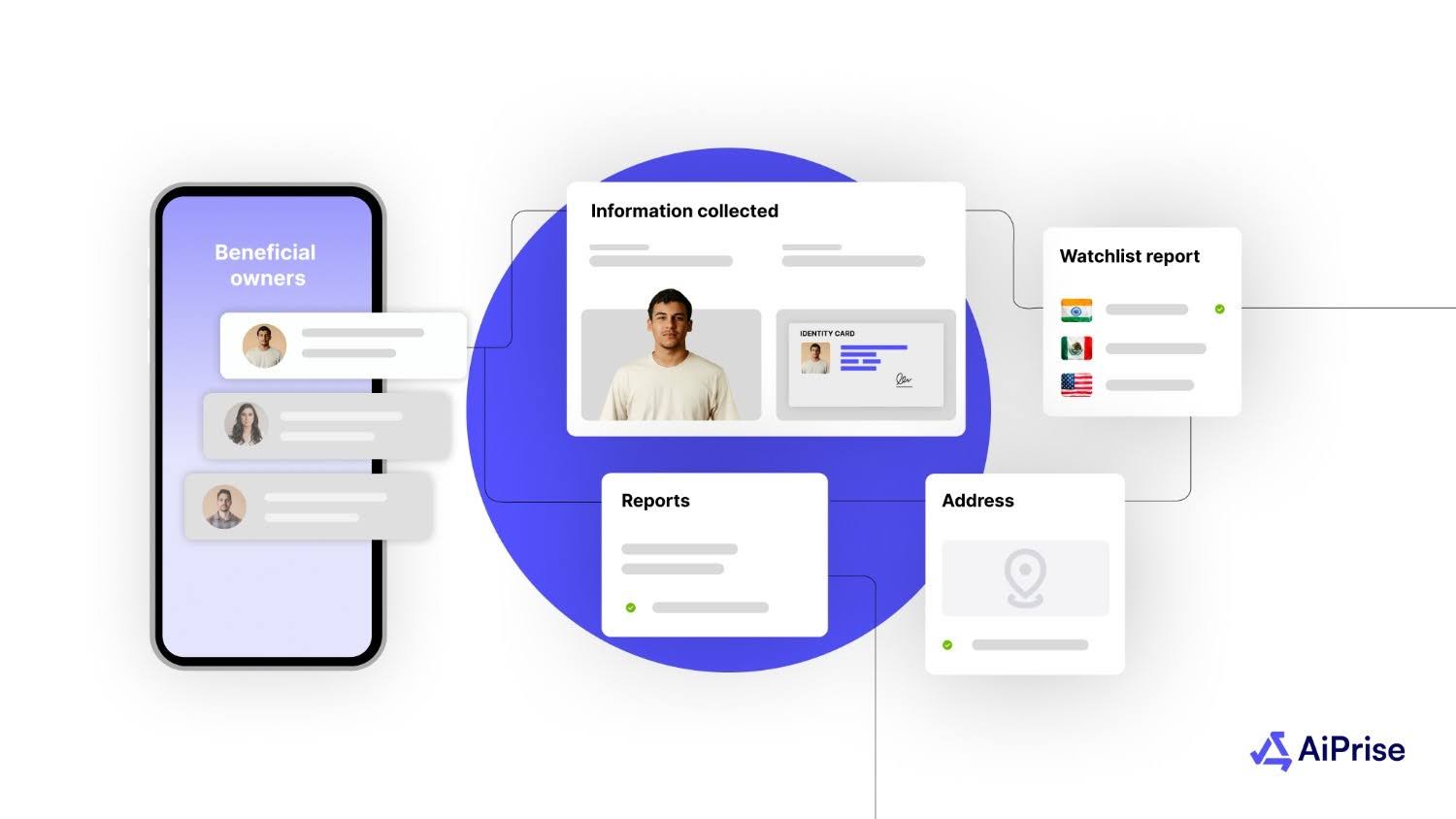
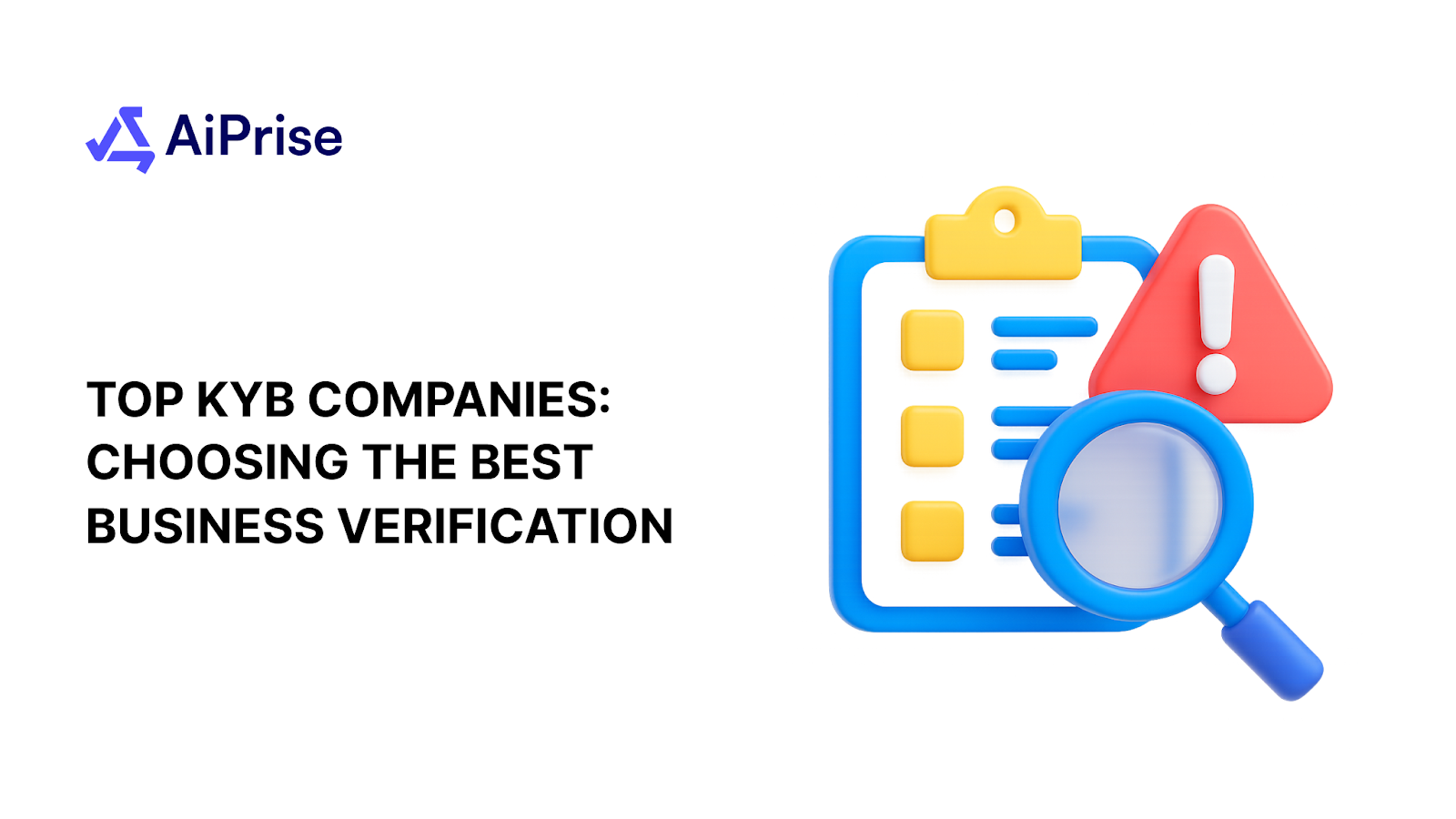
%20Can%20Improve%20Your%20Compliance%20Strategy.png)
